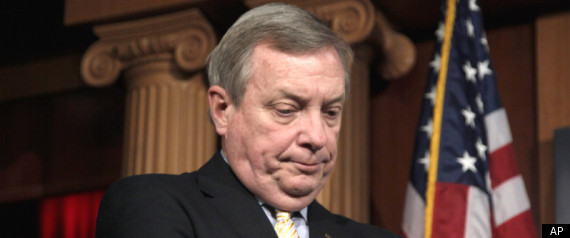 WASHINGTON -- The Republicans are killing Keynesian economics with their attempt to cut spending as the economy rebounds from a recession, Senate Majority Whip Dick Durbin (D-Ill.) said in a floor speech on Sunday.
WASHINGTON -- The Republicans are killing Keynesian economics with their attempt to cut spending as the economy rebounds from a recession, Senate Majority Whip Dick Durbin (D-Ill.) said in a floor speech on Sunday. "I would say ... that symbolically, that agreement is moving us to the point where we are having the final interment of John Maynard Keynes," he said, referring to the British economist. "He normally died in 1946 but it appears we are going to put him to his final rest with this agreement."
Keynes argued that aggregate demand was not always enough to spur full employment and that outside structures, such as governments, could influence the economy to create jobs and regulate business cycles. His thinking influenced later New Deal spending by President Franklin Delano Roosevelt.
Durbin said the economy is too weak for major cuts in spending, a view that is shared by many economists.
Although details of a debt deal are still unclear, lawmakers are likely to cut in the hundreds of billions of dollars over the next decade, beginning in the 2012 fiscal year. Commissions set up to create a path for deficit-reduction, such as the Bowles-Simpson commission, have advised against spending cuts for at least a year to protect the economic rebound.
"Their fear, and the fear that I share, is that if we make spending cuts at this point, it will not help economic recovery," he said.
Massive spending cuts as part of a spending deal, Durbin said, could cause the economy to sputter even if Congress can avoid economic turmoil by making an Aug. 2 deadline to raise the debt limit.
"So here we are in the horns of a dilemma," Durbin said. "In order to avoid the disaster that would occur August 2 if the United States defaulted for the first time in its history, we are being told we have to cut back on government spending and by cutting back on spending, we may also have a negative impact on our economy."
The Chamber of Commerce has warned against major spending cuts as part of a debt limit deal, asking lawmakers on Friday to be careful.
"The recovery is clearly on a lower trajectory, and it will likely be some time before the economy rebounds to the point it will create much in terms of job growth," Martin Regalia, the group's chief economist, said in a statement.
Origin
Source: Huffington
No comments:
Post a Comment